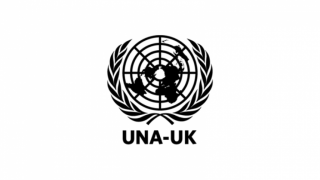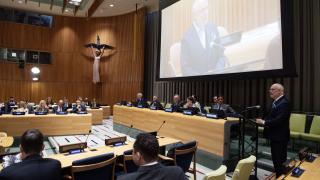
UNA-UK has called on the UK to take full advantage of the opportunities for genuine dialogue with non-nuclear-weapon states provided by next week's Vienna Conference on the humanitarian impact of nuclear weapons. Lord Hannay, Chair of the UN All-Party Parliamentary Group; Alistair Burt MP, a member of the Top Level Group; and Dr Ian Kearns of the European Leadership Network co-signed a letter from UNA-UK's Chair, Sir Jeremy Greenstock, to FCO Minister Tobias Ellwood.
The letter welcomes the UK's decision to take part in the Vienna Conference - the first such conference it will attend. It asks that the UK's delegation be of an appropriately high level and includes engaged parliamentarians. The letter also notes the UK's special responsibility to demonstrate its understanding of the dangers of nuclear weapons and to engage with the legitimate concerns held by non-nuclear-weapon states, NGOs and citizens.
As one of the five recognised nuclear powers, the UK can set an example by engaging fully with the humanitarian discourse. This would have a positive impact on international nuclear-weapon discussions at a time of increased global instability, when progress has stalled in fora such as the UN Conference on Disarmament.
Released earlier this year, UNA-UK's manifesto calls on the UK to make full use of the various opportunities to engage on non-proliferation and disarmament issues at both the national and global levels. It outlines steps the UK can take to further multilateral disarmament and fulfil its obligations under the Non-Proliferation Treaty.
The full text of the letter to Mr Ellwood is reproduced below:
Rt Hon Tobias Ellwood MP
Parliamentary Under Secretary of State
Foreign and Commonwealth Office
LONDONSW1A 2AH
2 December 2014
Dear Mr Ellwood,
We welcome the UK's recent announcement that it will attend the Vienna Conference on the humanitarian consequences of nuclear-weapon detonations and the risks associated with them.
As you will be aware, the past years have seen a growing number of states consider the humanitarian challenges posed by nuclear weapons. Whilst the five recognised nuclear powers - China, France, Russia, the UK and United States - were not in attendance at the two previous conferences on this issue in Mexico and Norway, these conferences nonetheless have had a positive impact on international discussions on nuclear weapons at a time of increased global instability and with progress stalled in fora such as the UN Conference on Disarmament.
The Vienna Conference, scheduled for 8-9 December 2014, now presents a real opportunity for the UK to foster genuine dialogue between nuclear- and non-nuclear states outside the confines of UN processes. The UK can maximise this opportunity by sending an appropriately high-level delegation, including engaged Parliamentarians, and by participating in a constructive and open manner with non-nuclear-weapon states. As a nuclear power, the UK has a special responsibility to demonstrate that it understands the destructive power of these weapons and to engage with the legitimate concerns held by non-nuclear-weapon states, NGOs and citizens.
This decision maintains the UK’s positive record in arms control, having played key roles in securing treaties on the arms trade, landmines and cluster munitions. As a nuclear-weapon state, the UK has an opportunity to set a positive example on this issue too by engaging fully with, and where necessary, responding to, the concerns of the international community.
Yours sincerely,
Sir Jeremy Greenstock
Chair, United Nations Association – UKAlistair Burt MP
Chair, Top Level Group of UK Parliamentarians for
Multilateral Nuclear Disarmament and Non-ProliferationLord Hannay of Chiswick
Chair, United Nations APPGDr Ian Kearns
Co-Founder and Director, European Leadership Network






